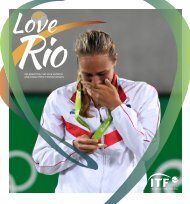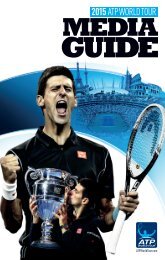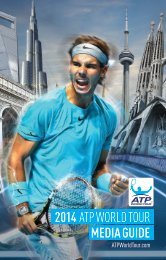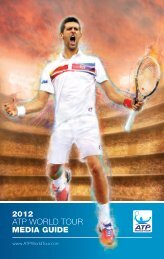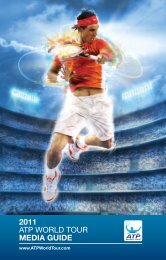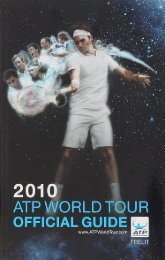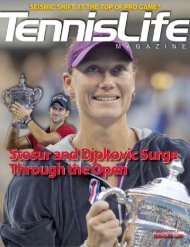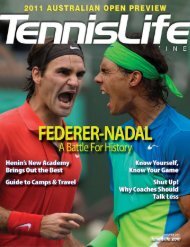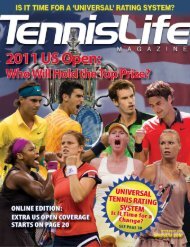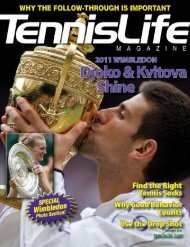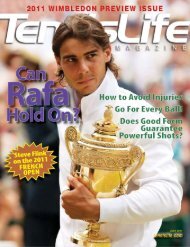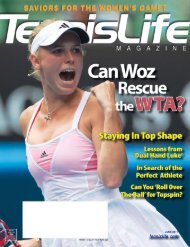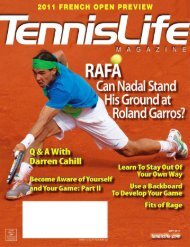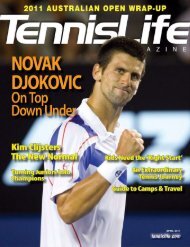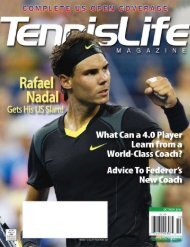A Champion's Mind - Pete Sampras
www.tennismoscow.me Insta:TENNISMOSCOW
www.tennismoscow.me Insta:TENNISMOSCOW
Create successful ePaper yourself
Turn your PDF publications into a flip-book with our unique Google optimized e-Paper software.
had won two U.S. Open titles by then, and he had done a brief stint at number one. He reached the ultimate<br />
plateau in the summer of 1999, almost a year to the day before we met in the 2000 Wimbledon final.<br />
Rafter was a popular, classy guy, although he was one of the very few rivals with whom I had—for a<br />
time—a testy relationship. It all started back in 1998 when Rafter beat me 6–4 in the third in the final at<br />
Cincinnati. In the press conference, someone asked me what the difference was between <strong>Pete</strong> <strong>Sampras</strong><br />
and Pat Rafter, and I said, “Ten Grand Slam titles.” It was the wrong thing to say. I just got kind of<br />
uncharacteristically emotional there, following a tough loss. He took offense and I don’t blame him.<br />
Rafter also tagged me in the semifinals of the U.S. Open, just weeks after that Cincinnati incident; I<br />
guess my snide put-down had him all fired up. Then, when he became number one, he made some remarks<br />
to the effect that it was great for tennis that I was no longer number one. Of course, the press were all over<br />
that, and they wanted my reaction. I took the high road, and just said that if Pat had an issue with me, he<br />
could talk to me face-to-face. The next day Pat called and apologized. He admitted he was being a little<br />
vindictive, and I told him that my own remarks in Cincinnati the previous year had been arrogant and ill<br />
conceived.<br />
We got along fine after that, although his game continued to give me fits. Pat was extremely crafty, and<br />
he could put a lot of pressure on me with his relentless, kamikaze-like net rushing. I had a lot of trouble<br />
with Pat’s serve; it wasn’t the pace or weight of his shots, and it wasn’t the speed, because he hit the<br />
kicker (a relatively slow serve) almost all the time. It was the way he mixed up his serves, moved them<br />
around, and kept me guessing. He was an absolute master of picking his service locations. He’d kick one<br />
out wide, then the next one would be into the body. I’m glad he wasn’t a lefty, able to kick it high to my<br />
backhand in the ad court. My life would really have been miserable then.<br />
My folks had flown to London the day before the final to attend one of my Grand Slam matches for just<br />
the second time. The first time was for my 1992 U.S. Open with Stefan Edberg, so I can’t exactly say this<br />
was a good omen. Throughout my career, they had chosen to remain in the background, partly because the<br />
hoopla surrounding a big tournament didn’t suit them. I know they were very wary about being identified<br />
for the television audience. They felt that tennis was my deal, they were shy people, and they didn’t want<br />
to appear to be basking in my glory.<br />
But this particular tournament was different; they wanted to be present for me, and to share in my<br />
potentially historic feat. I asked my parents what I could do for them in London, and they said they just<br />
wanted to talk to me to wish me luck before the match and wanted to stay off the television. I told them I<br />
could handle the first task, but I had no control over the second. We did find them seats in the crowd, but<br />
the NBC cameramen searched and found them in the stands anyway. So I ended up 1–1 on the wishes.<br />
Pat had played a great semifinal to beat Andre, and he came into the championship match riding an<br />
emotional high. We both played well at the start, thrusting and parrying for about forty-five minutes, to 4–<br />
all and then 5–all before the rains came. The rain delay had special significance for me, because it meant<br />
that the cortisone shot would be wearing off earlier in the match than usual. At this point, I was so close to<br />
winning the event that I was willing to toss caution to the wind and get another injection to get me through<br />
the final. But the doctor was pretty adamant about not doing that; he said we had touched it enough<br />
already. So after the delay I went back out, feeling considerably more uncomfortable than when we had<br />
stopped.<br />
I had my hands full and then some: I lost my nerve a little and Pat won the first-set tiebreaker 12–10.<br />
The next set went to the tiebreaker as well. When Pat jumped to a 4–1 lead, I thought I was going to lose<br />
the match. It was a shame—my parents had come all the way to London, and it looked like I would fail to<br />
produce a win again. But Pat, faced with a match that could become the highlight on his résumé (you know<br />
how those Aussies are about Wimbledon), faltered. He had two set points at 6–4 up in the tiebreaker, but<br />
he failed to convert either. I guarantee that if he’d won either of those points, he would’ve won the title.<br />
When I wriggled out of the jam and won the tiebreaker, the complexion of the entire match changed.



